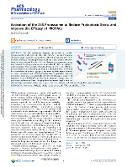Activation of the 26S Proteasome to Reduce Proteotoxic Stress and Improve the Efficacy of PROTACs

Publication date
2024Published in
ACS Pharmacology & Translational ScienceVolume / Issue
8 (1)ISBN / ISSN
ISSN: 2575-9108ISBN / ISSN
eISSN: 2575-9108Metadata
Show full item recordCollections
This publication has a published version with DOI 10.1021/acsptsci.4c00408
Abstract
The 26S proteasome degrades the majority of cellular proteins and affects all aspects of cellular life. Therefore, the 26S proteasome abundance, proper assembly, and activity in different life contexts need to be precisely controlled. Impaired proteasome activity is considered a causative factor in several serious disorders. Recent advances in proteasome biology have revealed that the proteasome can be activated by different factors or small molecules. Thus, activated ubiquitin-dependent proteasome degradation has effects such as extending the lifespan in different models, preventing the accumulation of protein aggregates, and reducing their negative impact on cells. Increased 26S proteasome-mediated degradation reduces proteotoxic stress and can potentially improve the efficacy of engineered degraders, such as PROTACs, particularly in situations characterized by proteasome malfunction. Here, emerging ideas and recent insights into the pharmacological activation of the proteasome at the transcriptional and posttranslational levels are summarized.
Keywords
proteasome, PROTAC, cAMP, cGMP, p38 MAPK, NFE2L1, NFE2L2, USP14
Permanent link
https://hdl.handle.net/20.500.14178/3081License
Full text of this result is licensed under: Creative Commons Uveďte původ 4.0 International







